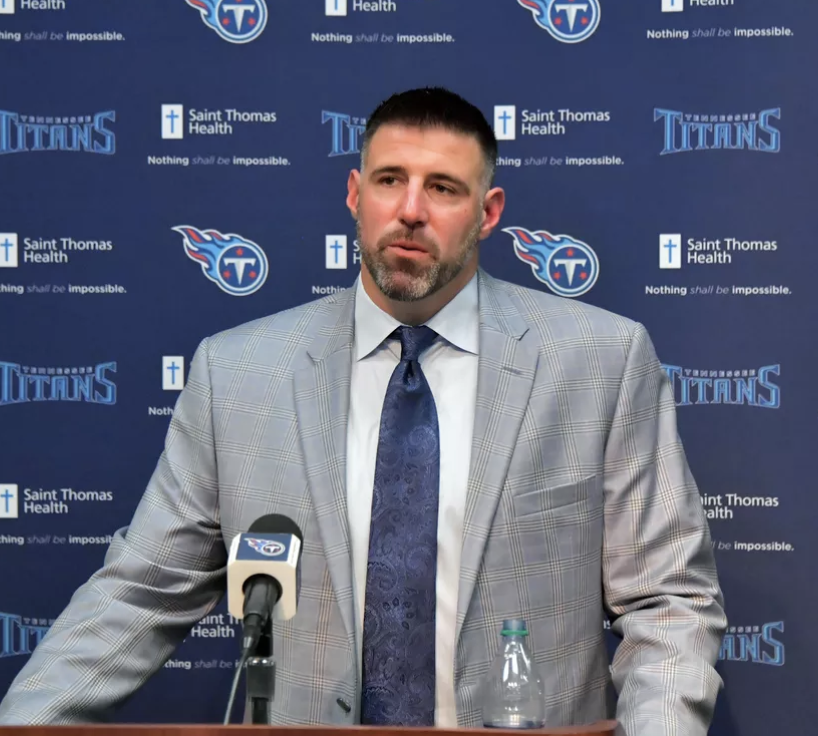Matty G, Guys on the Sideline Contributor
Mike Check: Re-evaluating the Mularkey-for-Vrabel Decision with “20/20” Vision
We don’t yet have the luxury of hindsight in assessing the Mike Mularkey-for-Mike Vrabel coaching shakeup in 2018, but that shouldn’t stop us from rekindling the debate that sharply divided the Titans fanbase at a critical point in the franchise’s history.
Now that Vrabel has logged his 20th game at the helm with a win against the Falcons, we can take a “20/20” view by comparing Mularkey’s final 20 games as the Titans’ skipper (including the playoffs) against Mike Vrabel’s first 20 games as head coach to form an early assessment of the decision.
Mike Mularkey: The “Exotic Smashmouth” Pioneer
| Record in last 20 games (including playoffs) | 11-9 |
| Record against teams that finished the season above .500 | 6-3 |
| Record against teams that finished the season .500 or below | 6-5 |
| Record against divisional opponents | 6-2 |
| Record in games decided by 4 points or less | 5-3 |
| Record in games Marcus Mariota didn’t start | 1-1 |
| Point differential | -56 |
The case for Mularkey: Aside from the obvious notch in his belt that Vrabel lacks—a playoff berth and win—Mularkey was able to achieve almost identical results over his 20-game stretch with a weaker, less experienced roster. He inherited a team that had won just five games combined in the previous two years and almost doubled that output in his first full season (nine wins in 2016) and sustained that output the following season. Albeit a relatively small sample size, Mularkey (6-3) was better than Vrabel has been thus far (4-5) against teams with a winning percentage above .500. If the Exotic Smashmouth Experience had been allowed to continue, Mularkey would have owned numerous picks in the 2018 draft and conceivably could have transitioned from a stabilizing presence to the leader of a serious playoff threat.
The case against Mularkey: A playoff win is not insignificant, especially in this era of Titans football. But there is always a degree of luck when 9-7 teams earn a playoff berth, and the Titans were just a handful of plays away from missing the postseason in 2017. Setting that aside, a strong case can be made that Mularkey underachieved in 2017—a season in which Andrew Luck missed all 16 games and Deshaun Watson missed nine games. The Titans did take care of business in the division (5-1) but struggled against non-divisional opponents (4-6) in the 2017 season. Mularkey’s biggest hurdle, and possibly Vrabel’s, too, at this point, was inconsistency. It really is remarkable, and not without good fortune, that he was able to guide the Titans to the playoffs in 2017 with a -22-point differential. The Titans were the only team in the league with a negative point differential to reach the postseason. That trend, like Mularkey’s job with the Titans, was unsustainable.
Mike Vrabel: The “Good to Great” Warrior
| Record in first 20 games | 11-9 |
| *Record against teams that finished the season above .500 | 4-5 |
| *Record against teams that finished the season .500 or below | 7-4 |
| Record against divisional opponents | 3-5 |
| Record in games decided by 4 points or less | 4-3 |
| Record in games Marcus Mariota didn’t start | 2-1 |
| Point differential | +36 |
*2019 games are based on records of teams the Titans played weeks 1-4
The case for Vrabel: Vrabel undoubtedly has a better roster than Mularkey had over these 20-game stretches, but also faced stiffer divisional opponents in 2018 with a healthy Andrew Luck and Deshaun Watson, so a 9-7 record in his inaugural season (including a road game in London that was not a factor for Mularkey) could be viewed as a baby step forward, given the usual growing pains. While still not a model of consistency, Vrabel is slightly better (7-4) than Mularkey was (6-5) at defeating teams with a .500 or below winning percentage. Perhaps Vrabel’s biggest improvement over Mularkey is the team’s point differential (+36 compared to -56 in their respective 20-game stretches), but it has yet to materialize in more wins. Nonetheless, most fans would agree that Vrabel’s offense is an improvement over Mularkey’s, and a case can be made that we are currently witnessing the defense solidify itself as a Top 3 unit.
The case against Vrabel: “Good to Great” was implied when the Titans moved on from Mularkey—the owner of a 18-14 regular season record (in his two full seasons) with a playoff win to boot—and brought in Vrabel. Right? Vrabel inherited a better roster than Mularkey and a boatload of draft picks in 2018. And the Titans have made several moves in free agency to bolster a young, talented squad (at least on paper). Yet the results, so far, are almost identical to the naked eye. And Vrabel’s record against divisional rivals is alarming, especially considering the opposing signal callers and situations this season—Jacoby Brissett at home and Garner Minshew in his second career start and on a short week. Titans fans, for the most part, are willing to give him a chance to grow as a first-time head coach and are prepared to accept some bad decisions along with gambles that pay off. But decisions like the one in Atlanta last week (going for it on 4-and-1 instead of kicking a field goal to make it a three-score game) have to be concerning for fans who expect better judgement from a coach who should be showing signs that he’s learning from mistakes made over the past 28 games (including the preseason).
The 20/20 Verdict
Frankly, the jury is still out. Although most Titans fans—if they’re being honest—would admit that they expected slightly better results from Vrabel at the 20-game mark (especially given the roster and draft picks he inherited), they are mostly in a wait-and-see holding pattern.
Unfortunately, that sentiment is the overarching theme of this Titans team, with high-profile players like Mariota, Jack Conklin and Derrick Henry at or near the end of their contracts and still needing to prove that they are franchise-caliber players worthy of long-term deals.
Hindsight may be 20/20, but a 20-game comparison of Mularkey and Vrabel doesn’t give us the clarity we need to definitively end this debate. Another “Mike Check” at the end of the season should help bring the answer into focus, however.
Follow Matt Griffin on Twitter @mattgriffinnash


Matty G, do you feel the Titans made the right move?
What I don’t understand is why a 9-7 team that made the second round of the playoffs even considered firing their head coach. Did they think Belichick was coming to Nashville or something?
It is my opinion that the Titans did themselves and especially Marcus Mariota a grave disservice. Firing Mularkey guaranteed the young QB would have to learn a new offense and new set of plays again in his 4th year. It is rare for a rookie head coach to make a run to the Super Bowl, when they do, it is usually a fluke that fades quickly. Doug Pederson and Sean McVay are good examples of this, after a good year or two, they have implemented all the trick and previously unknown plays and their teams start losing to more experienced head coaches. Mularkey was never going to be the flashiest or most popular coach in the league, but he deserved at least 1 one more year. Top tier coaches and players will look at this move Titans ownership made and shy away from going to Nashville because of it.
Guys on the Sideline or Guys on the Sidelines?